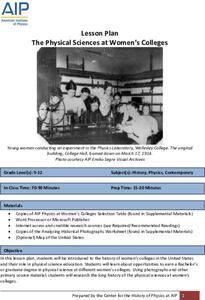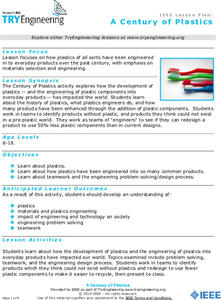American Institute of Physics
The Physical Sciences at Historically Black Colleges and Universities
The history of science instruction at Historically Black Colleges and Universities (HBCUs) is the focus of a instructional activity that explores the early challenges these institutions faced in accessing equipment for their labs and...
Columbus City Schools
The Mystery of Earth’s History
Every living creature can leave a fossil record, yet most fossils belong to extinct organisms rather than ones currently living. Scholars learn about dating rock layers, fossils, and the environment of the past. Pupils understand that...
Newspaper Association of America
Cereal Bowl Science and Other Investigations with the Newspaper
What do cereal, fog, and space shuttles have to do with newspapers? A collection of science investigations encourage critical thinking using connections to the various parts of the newspaper. Activities range from building origami seed...
American Institute of Physics
The Physical Sciences at Women's Colleges
After a brief introduction to the history of women's colleges in the United States and a discussion of the resistance such institutions faced, young scientists investigate seven traditionally women's colleges and their physics programs....
NOAA
History's Thermometers
How is sea coral like a thermometer? Part three of a six-part series from NOAA describes how oceanographers can use coral growth to estimate water temperature over time. Life science pupils manipulate data to determine the age of corals...
Columbus City Schools
History Helps When It Comes To Plate Tectonics
Get ready to move, shake, slip, and slide with a well-rounded plate tectonics unit! The engaging resource includes everything you need to inspire eighth grade science scholars, from worksheets to demonstrations. Assess their...
Royal Society of Chemistry
The 400m Event—Chemistry and Sport
How do Olympic runners succeed in physically demanding events like the 400-meter dash? Physiology scholars explore the relationship between acids, bases, and the muscular system through a scenario-driven activity. The lesson focuses on...
Howard Hughes Medical Institute
Got Lactase? The Co-Evolution of Genes and Culture
Does the human body evolve as quickly as human culture? With a stellar 15-minute video, explore the trait of lactose intolerance. Only about 1/3 of human adults seem to still have the enzyme lactase and therefore, the ability to digest...
Curated OER
Let's Get Physical
Explore the benefits of physical activity and how it will affect your students' health. Students track their physical activities for one week and then compare their results. Collaboration with a math teacher woould be useful as it would...
University of Colorado
Astro-Chronology
Class members play a version of the game Chronology to determine when certain scientific events occurred in history. Teams play until someone has 5-10 events in the correct order.
American Institute of Physics
African American Inventors in History
A two-part lesson introduces young historians to the work of famous African American inventors. Groups first research and develop a presentation of an inventor that includes biographical information and information about one of their...
New York City Department of Education
Egypt
This six-week unit encompasses all subjects with a focus study on world history and the development of ancient civilizations. As gifted and talented students dive into the interesting yet challenging topic of Egypt, they think critically...
Curated OER
Physical and Chemical Properties of Matter
Students identify the physical and chemical properties of matter. They review the types of matter. Students list the four states of matter (Solid, Liquid, Gas and Plasma). They recognize and describe the different types of matter.
Institute of Electrical and Electronics Engineers
A Century of Plastics
After reading about polymer materials, engineer trainees examine how plastics have been integrated into everyday products. In groups, they compile a list of products made entirely without plastics and then, as a closing activity, try to...
American Institute of Physics
African American Physicists in the 1960s
Physicists Herman Branson and Tannie Stovall provide young scholars with two very different perceptions of the status of African American physicists in the 1960s. After reading and comparing the bios of these two men, class members read...
Curated OER
Disease & Epidemics: Architects of History
Students explore disease and its relationship to history and literature. They investigate issues that range from early biological warfare and historical disease treatments, to observing today's race for the cure against current emerging...
PHET
Science and Engineering Conference
Young scientists present their experimental designs from the previous experiment. The ninth lesson in the series outlines what learners should present, what class discussions should happen, and the solution NASA came up with for the same...
American Institute of Physics
The Black Scientific Renaissance of the 1970s-90s: African American Scientists at Bell Laboratories
A two-part instructional activity asks young scientists to research the contributions of African American scientists at Bell Laboratories. After presenting their findings, class members watch two demonstrations that introduce them to...
Curated OER
Fossil Fuels (Part II), The Geology of Oil: Topographic Mapping, Crustal Deformation, Rock Porosity, and Environmental Pollution
Learners review an interpretation of geologic history and relate it to the formation of oil deposits. They explore and explain factors controlling the porosity and permeability of sediments and sedimentary rocks. Pupils also interpret...
PHET
Earth’s Magnetic Field from Space
Feel the pull of science! The final installment of this 18-part series is an application of everything learned in the previous high school lessons. Scholars are given a magnetic field map and must propose an arrangement of magnets that...
American Institute of Physics
The Physicist's War: Dr. Herman Branson and the Scientific Training of African Americans during World War II
The mobilization of soldiers for World War II resulted in a worker shortage in the defense industries, especially in the fields of physics and other sciences. The Engineering, Science, and Management War Training program (ESMWT) was...
Curated OER
Special Traits: Alabama quarter reverse
Who knew a state quarter could say so much? Alabama's quarter is embossed with an image of Helen Keller, pupils will use this image to think about what the phrase "Spirit of courage" means. They will use a graphic organizer to...
Curated OER
Earth's History
Seventh graders study the law of superposition by creating models of fossils in layers of rock. They examine how fossils are usually found in sedimentary rock which leads to the study of geologic history in those rocks.
Curated OER
Making Cents of Density
Students utilize their knowledge of the physical properties of matter such as mass, volume, and density to solve a problem. They utilize the scientific method to solve a problem. Pupils analyze their data to determine whether their...

























